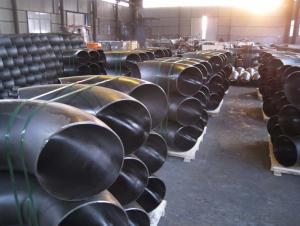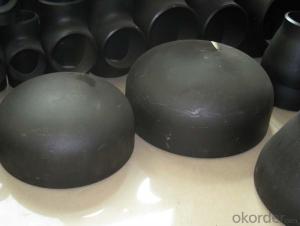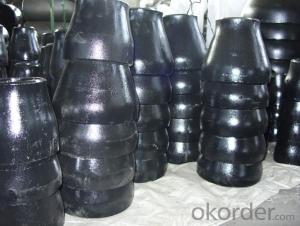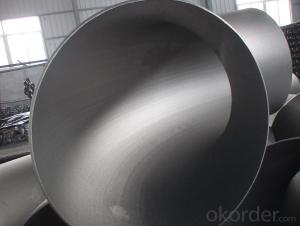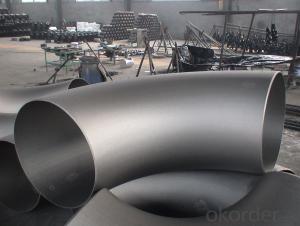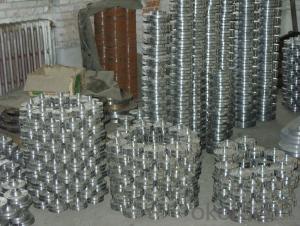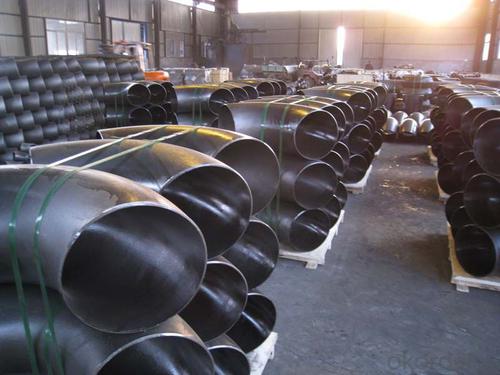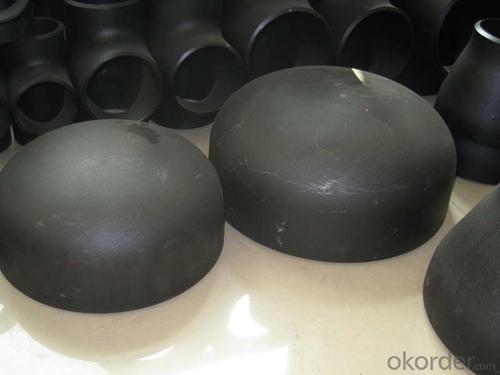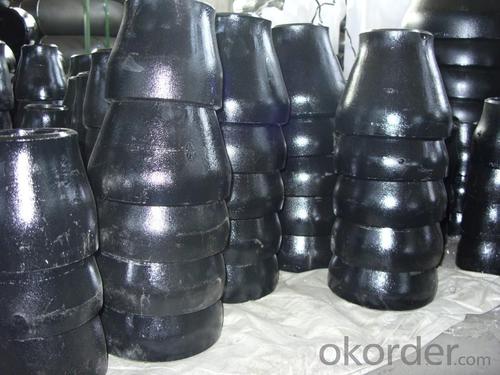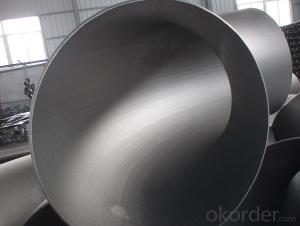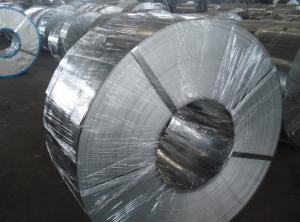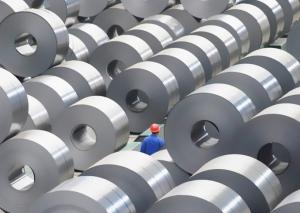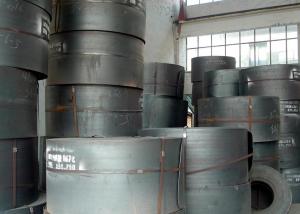Carbon Steel Pipe Fittings SR BEND
- Loading Port:
- China Main Port
- Payment Terms:
- TT OR LC
- Min Order Qty:
- -
- Supply Capability:
- -
OKorder Service Pledge
OKorder Financial Service
You Might Also Like
Specifications
pipe fitting elbow
Certificate:ISO:9001-2000
New material,completely meet asme and din standard
Best price
1. type: AISI ASTM A234 WPB BW Con Elbow
2. Size: 1/2"-48"(1/2"-24"is seamless and 26"-48"is welded)
3. Wall thickness: sch10-160, STD, XS, XXS
4. Material: A234WPB, A420WPL6, A420WP5, WP11, WP12, WP22, etc
5. Welding line: seamless
6. Angle of bend: 30, 45, 90, 180degree
7. Bending radius: SR, LR
8. Standard: ANSI B16.9, JIS, SB, DIN, GB
9. Surface treatment: black paint, vanis paint, black rust-proof oil,
transparent oil, hot galvanizing
10. Application: petroleum, electricity, chemical, natural gas, metallurgy,construction,
shipbuilding and other fields because of its high pressure, high temperature, etc
11. connection: welding
12. technics:forged
13.Certificate:ISO9001 - 2000, CE, SGS, etc.
14. packaging: wooden case, pallet, container or in accordance with the
requirement of customers
15. Principle: quality fist, customer first, credit first
16. payment: L/C T/T
17. delivery time: 7-25 days after payments
18. Notes: the bevel can be made in accordance with the special requirements
of the customers
19. Others: we can also produce the products according to the requirements
of the customers
The main production:
1. PIPE FITTINGS: elbows, tees, bends, reducers, cap, flanges and sockets etc.
2. PIPE: bult welded pipes, seamless pipes, threaded pipes, etc.
We sincerely welcom customers at home and abroad to visit us and seek common development.
- Q: How do steel products contribute to the electrical and power transmission sector?
- Steel products play a crucial role in the electrical and power transmission sector due to their durability, strength, and conductivity. They are used in the construction of power transmission towers, electrical poles, and substations, providing a sturdy framework for overhead power lines. Steel cables and conductors, known for their high electrical conductivity, are used for transmitting electricity over long distances without significant power loss. Additionally, steel is used in the production of transformers, generators, and other electrical equipment due to its magnetic properties and ability to withstand high temperatures. Overall, steel products contribute to the reliability and efficiency of the electrical and power transmission sector.
- Q: How is steel used in the production of textile machinery?
- Steel is used in the production of textile machinery due to its strength, durability, and ability to withstand high temperatures. It is commonly used in the construction of machine frames, gears, and other mechanical components that require stability and precision. Additionally, steel is often used in the manufacturing of textile machine parts that need to be resistant to wear and tear, ensuring the longevity and reliability of the machinery.
- Q: What are the different types of steel scaffolding systems?
- There are several types of steel scaffolding systems, including tube and coupler scaffolding, system scaffolding, and frame scaffolding. Tube and coupler scaffolding consists of tubes and couplers that are connected together to form a stable structure. System scaffolding uses pre-designed components that can be easily assembled and dismantled, providing flexibility and efficiency. Frame scaffolding is made up of frames and cross braces, offering a simple and sturdy solution for construction projects.
- Q: How is steel sheet metal formed into automotive body panels?
- Steel sheet metal is formed into automotive body panels through a process called stamping or pressing. In this process, the steel sheet is placed between two dies, one of which has the desired shape of the body panel. The top die is then pressed onto the sheet metal with high force, causing it to bend and take the shape of the die. This process is repeated multiple times, with different dies and angles, until the desired shape and structure of the body panel is achieved.
- Q: How does steel tube bending work?
- Steel tube bending works by applying force to a steel tube in a specific location, causing it to deform and bend into the desired shape. This force can be applied through various methods such as hydraulic or mechanical bending machines, which exert pressure on the tube to gradually bend it to the desired angle or curve. The process requires precision and expertise to ensure the tube retains its structural integrity and meets the required specifications.
- Q: What are the different types of steel bolts and their uses in the construction of power plants?
- There are several types of steel bolts commonly used in the construction of power plants. Some of the most common types include anchor bolts, structural bolts, and high-strength bolts. Anchor bolts are used to secure equipment, machinery, and structures to the concrete foundation in power plants. They provide stability and prevent movement or displacement. Structural bolts, on the other hand, are used for connecting steel members together in power plant structures. These bolts are designed to withstand high loads and provide structural integrity to the plant's framework. High-strength bolts are specifically designed to withstand extreme forces and provide the necessary strength for critical connections. They are commonly used in the construction of power plants to connect heavy equipment, turbine foundations, and other crucial components. Overall, these different types of steel bolts play a vital role in ensuring the safety, stability, and structural integrity of power plants during their construction process.
- Q: What is the role of steel in the infrastructure development?
- The role of steel in infrastructure development is crucial as it is one of the most widely used materials in construction. Steel offers exceptional strength, durability, and versatility, making it an ideal choice for various infrastructure projects. It is used in the construction of bridges, buildings, highways, railways, and other essential structures. Steel's high tensile strength allows for the creation of large, sturdy structures that can withstand heavy loads and harsh environmental conditions. Additionally, its ductility allows for flexibility in design and construction, enabling architects and engineers to create innovative and efficient infrastructure solutions. Overall, steel plays a vital role in ensuring the safety, longevity, and sustainability of our infrastructure.
- Q: What are the uses of steel in the construction of shopping malls and retail centers?
- Steel is extensively used in the construction of shopping malls and retail centers due to its exceptional strength and durability. It provides structural support for large open spaces, allowing for flexible and customizable designs. Steel beams and columns are also used to create intricate facades and can support the weight of multiple floors. Additionally, steel is fire-resistant, ensuring the safety of occupants. Overall, steel plays a crucial role in creating safe, functional, and visually appealing shopping environments.
- Q: What are the applications of alloy steel in the energy sector?
- Alloy steel finds various applications in the energy sector due to its exceptional mechanical properties and resistance to corrosion and high temperatures. It is commonly used in the construction of power plants, oil and gas pipelines, and nuclear reactors. Alloy steel is also utilized in the manufacturing of turbine components, such as shafts and blades, as well as in the production of drilling equipment for the exploration and extraction of oil and gas. Overall, alloy steel plays a crucial role in enhancing the efficiency, durability, and safety of energy infrastructure.
- Q: How is steel used in the fabrication of bridges?
- Steel is commonly used in the fabrication of bridges due to its high strength and durability. It is used to construct the main load-bearing elements of the bridge, such as beams, girders, and trusses. Steel's ability to withstand heavy loads makes it an ideal material for bridge construction. Additionally, steel can be easily fabricated and welded, allowing for efficient construction and customization of bridge designs.
Send your message to us
Carbon Steel Pipe Fittings SR BEND
- Loading Port:
- China Main Port
- Payment Terms:
- TT OR LC
- Min Order Qty:
- -
- Supply Capability:
- -
OKorder Service Pledge
OKorder Financial Service
Similar products
Hot products
Hot Searches
Related keywords
